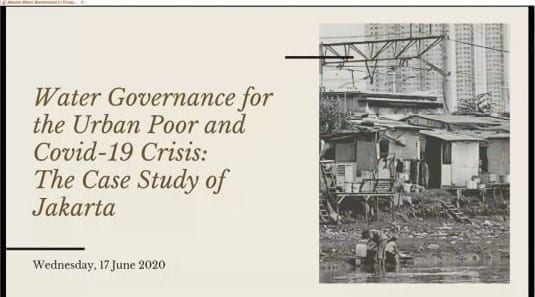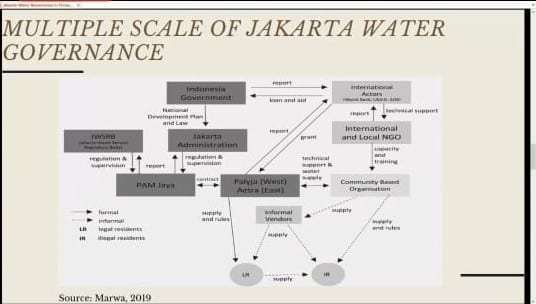
Yogyakarta, June 17th 2020—The availability of water, especially clean water, is one of the most important thing in the middle of this pandemic. Clean and healthy living done by washing our hands, cleaning our body, and drinking water, surely involves water. The urgency of the accessibility of clean water increases in places that becomes the center of Covid-19 spread – such as Jakarta, and also for groups that are prone to get Covid-19 – such as the urban poor. Unfortunately, based on the BPS data, only 76,4% of Indonesia’s population have access to proper hand wash equipment that includes soap and clean water. In Jakarta, only two thirds of the population have access or pipe water. To delve into the issue, the Institute of International Studies of Gadjah Mada University’s International Relation Department chose to raise the issue of water governance.
Titled “Water Governance for the Urban Poor and COVID-19 Crisis: the Case Study of Jakarta”, this discussion invites Marwa, M.Sc., a researcher in UGM’s World Trade Center, as a speaker. In presenting her analysis on the topic, Marwa uses the perspective of environmental justice and feminist political ecology. Beforehand, the discussion is opened by the moderator, Handono Ega P., on 15:05 PM when there is enough people in the Google Meet discussion room.
The environmental justice perspective was used by Marwa to analyze the water governance in Jakarta through three aspects; the distribution, recognition, and participation aspect. Here, Marwa explains that the root problem of water governance inequity in Jakarta exist in those three aspects. Unfortunately, Marwa said, in Jakarta, water governance is only focused on the improvement of the distribution aspect without fixing the recognition and participation aspect. Without paying attention to those three aspect comprehensively, inequity might always happen.

This reality can be seen from the water governance policies implemented in Jakarta, which includes cross subsidy tariff, flexible payment mechanism, and master meter program. These three programs, Marwa explained, forgets the fact that a lot of the lower middle citizens do not qualify for the help offered in that program. For example, the flexible payment mechanism is meant to make the payment for the lower middle easier, however this policy doesn’t pay attention to lower middle class citizens that is deemed “illegal” because they don’t have a permit to stay.
In Jakarta, water governance happen in several scales, starting from the international, national, to city scale. Marwa shows the working scheme for water governance in Jakarta as well as the actors that are involved. That scheme shows that the smallest scale of water governance –which is on the community and family scale –tends to not get sufficient attention. This still goes on despite the fact that in the community and family scale, there is an everyday water practice to implement.
Then, Marwa shows the everyday water practice chart that she adopted from Allen which has already been altered to match the condition happening in Jakarta. To complement that data, Marwa also shows an interview done with three women with different condition and backgrounds, who live in informal houses. This interview shows interesting results. It shows that the difference in the condition and background between the women results in a difference in their everyday water practices too. Of course, this result also shows which women – with which background – that is most privileged in their everyday water practices.
In this pandemic, Jakarta government’s initiative in water governance only shows through providing facilities to wash our hands. However, citizens still need to pay 500-800 thousand rupiah per month to pay their water bill. This have a potential to hurt the citizen because in the middle of the pandemic, citizen’s revenue might also decrease. As a result of that, citizens need to compromise their sanitation need. With the Covid-19 pandemic, the urgency for a fair and sustainable water governance is getting stronger. By the end of the material explanation, Marwa summarizes the explanation she gave. Other than that, Marwa also gave a recommendation to help solve Jakarta’s water governance issue.
The discussion was followed by a question and answer session which was quite interesting because some attendants ask their questions while reflecting on their own experience in water governance. In this question and answer session, Marwa reiterates that whatever solution that wants to be implemented to solve Jakarta’s water governance, that solution still needs to pay attention to the context of the place of implementation. Before the discussion is closed, the moderator asked all attendants to turn on their camera to take a photo together. The discussion ended at 16:15 pm.
